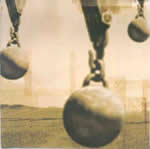|
|
 |
Dusted Reviews
Artist: Escapade Album: Rule #3 Label: Submergence Review date: May. 28, 2003 |

|
|
|
 |
Early High Water
Although post-rock and its myriad fractalizations – drone rock, post-psychedelic rock, Radiohead Rock, etc. – owes its recent historical development to a pungent post-punk mix of early ’90s "alternative" explorations that merged with the resurgence of electronica (from Krautrock to Tortoise and the heady days of Pavement, Sonic Youth and Nirvana), post-rock's lengthy manifestations owe an obvious debt to the rebellious and tripped-out days of the '60s. Not the poppy Sixties, but the dark underbelly that consists of all the unnamed bands that go unmentioned in the panoply of greats (all those others lost in the vinyl dustbins of history). Post-rock is new, yes, but it's also old, in the way that Frank Zappa sounds new and Escapade sounds...well, like a practicing '60s psychedelic rock group trying to play out a workable cover of Pink Floyd's "Interstellar Overdrive" (see track 2, which is exactly this). Post-rock owes much to these '60s pioneers because, unlike today, the bands of the '60s were tied to an entire generational movement that saw its aesthetic excess and exploratory music as singing the refrains of a generation of resistance and radicalism directed at undermining if not conducting the long-awaited revolution against the Establishment. Who cares if it failed or that it burnt itself out – there was a moment of brilliance that in the lived experience of music sounded itself out as an incredible singularity, an overwhelming force that Hunter S. Thompson inscribes as a revelation of the high, white note in Fear and Loathing in Las Vegas – the "high water mark" where the tide broke and turned back...but up until that point, it was unstoppable: a spark could be struck in any direction. In the music from the '60s one can hear that spark. The political energies of '60s psychedelic rock were wired into a milieu of festivals, happenings, revolts... sounds of an entire generation gone mad in the face of bureaucratic insanity on behalf of a violent war-machine – much like the direct connections between the '80s DIY punks and anarchist-squatters and early '90s raves and the break-in warehouse scene alongside the rise of BBS and internet culture.
Today?
What we have here, despite this dark psychedelia, and the rise and fall of drums, soaring synthlines and axe-grinding riffs, is a metal-influenced progressive rock that wanders astray into self-reflexive aesthetic territory. A random stab at improvisation punctuated by drones and noise and sudden releases of anthemic guitar solos. As "Interstellar Overdrive" figures predominantly as a historical cover on this album, by way of comparison we can observe how Pink Floyd Live in Pompei – when the Floyd pull out the stops on live renditions of "Careful With That Axe, Eugene," "Echoes" (Parts I and II) and "Set Your Controls For The Heart of the Sun," all pre-Dark Side material – exhibits all the narcissistic tendencies of self-indulgence that remain, nonetheless, set aflight and set afire: not controlled, but transformed to creative avenues, whereas Escapade's tendencies to the same on Rule #3 err on the side of a fascinating redundancy. "Mysterious Utterances," a soundscape of synthesizer, swirling sounds and plucked instrumentations, is by far the most thoughtful journey, and at the same time, also the shortest, at 5:07. While, on the other hand, "A Symphony of Sirens," at 19:11, is the longest track, and – like recent work by Kinski – could be cut to half its length with the qualitative amount of musical directions expressed. Given that it's also the first track, its placement reflects a poor call in creating a sustained journey of listening.
Aesthetic indulgence becomes an obvious formalism when it loses all touch with the moments of its social radicalism. Post-rock has maintained its edge through its continuous movement, as witnessed in the subsequent releases of Radiohead. Like electroclash, throwback dark psychedelia remains a nostalgic bad trip as an attempt to capture an incommensurable past. It's gone. If Escapade desires to remap the dark and serious terrain of psychedelic rock without falling into the same traps that beset '70s prog-rock (cockrock), it needs to ask some hard questions... For what ties the creative sonic energies to the mix of the social we are in today? ...and as of tonight, a world where musical resistance is all the more needed in the face of unprecedented violence by the world's only superpower.
By tobias c. van Veen
|







